St. Patrick’s Seminary and University is committed to the protection of the privacy of seminarians and their educational records. Annually, the Seminary informs students of their rights under the Family Educational Rights and Privacy Act of 1974 (FERPA), as amended, through publication in the Seminary’s academic catalog and via an email from the Registrar’s Office during the fall registration period. The Family Educational Rights and Privacy Act (FERPA) affords students certain rights with respect to their educational records, including the right to review and amend their record, the right to consent to disclosures, the right to restrict the release of directory information, and the right to file a complaint with the US Department of Education regarding the Seminary’s compliance with FERPA. The following procedures are in place to implement this Policy as required by FERPA:
1. Release of Academic Records: Official copies of academic records will be released to a third party only upon the written request of the student. Written requests are to be made through the Registrar’s Office. Seminarians who are affiliated with a diocese or religious order are asked to sign a consent form, valid for the duration of their enrollment, allowing regular transmittal of grades and evaluation reports to pertinent diocesan or religious officials.
2. Right to Inspect and Review: A seminarian shall have the right to inspect and review his education records within 45 days from the day the Seminary receives a request for access, except for those portions of the record protected from review by State or federal law.
3. Destruction of Records: The Seminary periodically may destroy education records as required or permitted by applicable law. However, the Seminary will not destroy any education records while there is an outstanding request to inspect and review those records, which has been made in accordance with this Policy.
4. Request for Amendment: A seminarian may challenge the content of his education record and request an amendment thereto if the student believes the records are inaccurate, misleading, or otherwise in violation of the student’s privacy rights under FERPA.
5. Right to a Hearing: A seminarian who objects to a decision by the Seminary not to make a requested amendment to his education records or who otherwise wishes to challenge the content of his education records on the grounds that the information contained in the education records is inaccurate, misleading, or in violation of his rights of privacy will have the right to a hearing for this purpose, in accordance with the provisions of this Policy and applicable provisions of the seminarian appeals procedure.
6. Release of Personally Identifiable Information: No release of personally identifiable information shall be made by the Seminary without a seminarian's prior consent, except to the extent that FERPA authorizes disclosure without consent (see items 9 and 10 below).
7. Right to file a complaint: Seminarians have the right to file a complaint with the U.S. Department of Education concerning alleged failures by the Seminary to comply with the requirements of FERPA. The Office that administers FERPA is:
Family Policy Compliance Office
US Department of Education
400 Maryland Avenue, SW
Washington, DC 20202-5901
8. Privacy of Distance Education Seminarians: The privacy of distance learners at St. Patrick’s Seminary is protected in the same manner as those enrolled in traditionally delivered courses. A comprehensive system of storage has been developed which ensures that seminarian records are accessed by authorized persons only and will be stored in a safe and secure manner.
9. Seminarian Directory Information: FERPA also allows the Seminary to disclose directory information without the seminarian’s permission. Directory information may include name, address, telephone number, email address, date and place of birth, dates of attendance, honors and awards, date of graduation, degree conferred, most recent educational institution attended, diocesan affiliation and other similar information, as defined by the Seminary, which would not generally be considered harmful to the seminarian, or an invasion of the seminarian’s privacy. If a seminarian does not wish such directory information to be released, the seminarian must file a request to prevent disclosure of directory information with the Office of the Registrar. This request must be on file within 30 days of the first day of class during the semester of initial enrollment and must be refiled annually thereafter.
10. Exceptions: Under FERPA the Seminary retains the right to disclose personally identifiable information to those deemed to have a legitimate educational interest in the seminarian’s records. These include, but are not limited to:
- School officials with legitimate educational interest;
- Other schools to which a student is transferring;
- Specified officials for audit or evaluation purposes;
- Appropriate parties in connection with financial aid to a student;
- Organizations conducting certain studies for or on behalf of the school;
- Accrediting organizations;
- To comply with a judicial order or lawfully issued subpoena;
- Appropriate officials in case of health and safety emergencies; and
- State and local authorities, within a juvenile justice system, pursuant to specific state law.
